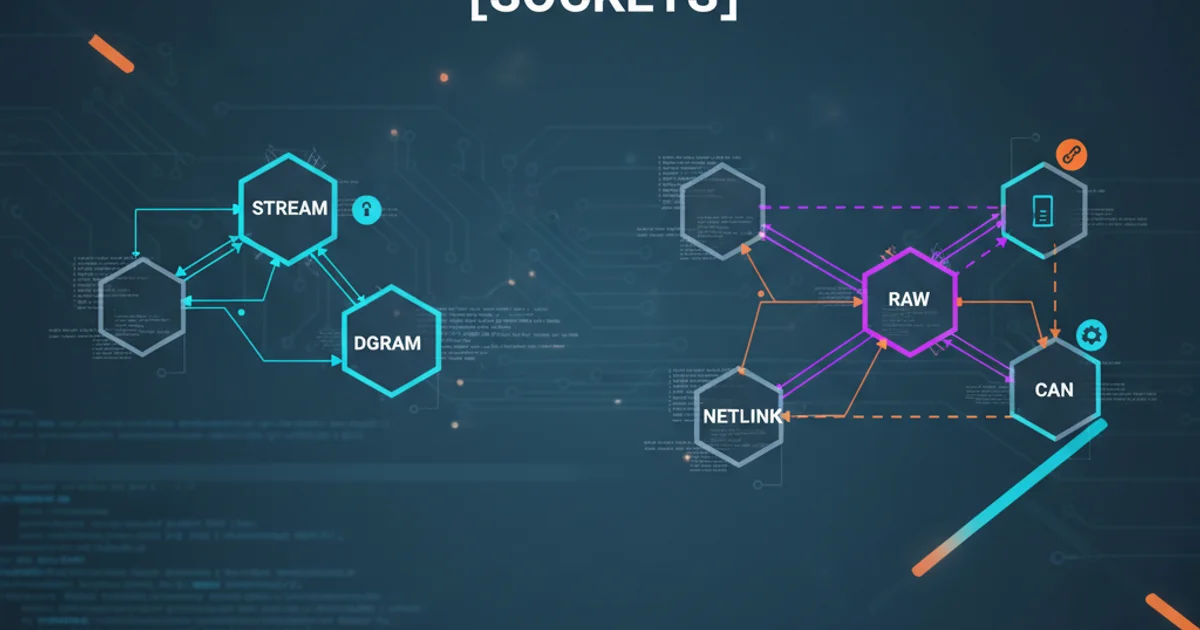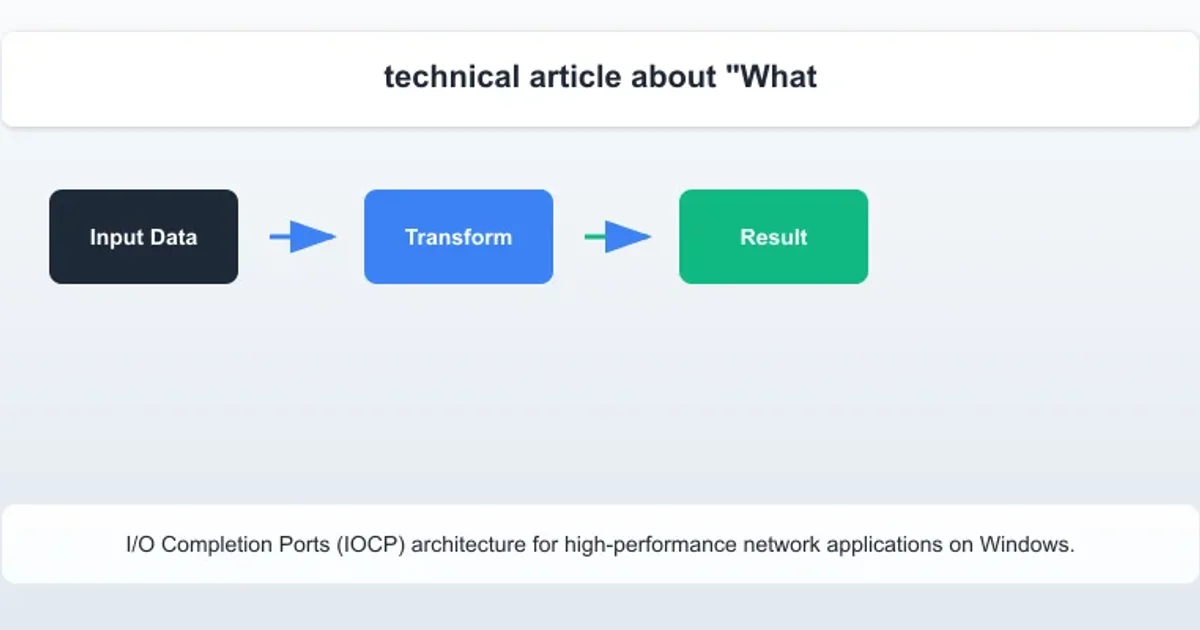What more socket APIs are available? What are the differences between each of these Socket API?
Categories:
Exploring Advanced Socket APIs: Beyond the Basics

Dive into the diverse world of socket APIs, understanding their functionalities, use cases, and the key differences between standard POSIX sockets and Windows Sockets (Winsock).
Socket programming is fundamental to network communication, allowing applications to send and receive data across a network. While the basic socket(), bind(), listen(), accept(), connect(), send(), and recv() functions are widely known, the landscape of socket APIs extends far beyond these core operations. This article explores some of the more advanced and specialized socket APIs available, highlighting their unique features and the scenarios where they excel, with a particular focus on distinctions between POSIX (Unix-like systems) and Winsock (Windows) implementations.
Core Socket Concepts and API Families
Before delving into advanced APIs, it's crucial to understand the foundational concepts. Sockets provide an endpoint for communication, identified by an IP address and a port number. They operate in different domains (e.g., AF_INET for IPv4, AF_INET6 for IPv6, AF_UNIX for local inter-process communication) and types (e.g., SOCK_STREAM for TCP, SOCK_DGRAM for UDP). The primary API families are POSIX Sockets, prevalent in Unix-like operating systems, and Winsock, specific to Windows.
flowchart TD
A[Application] --> B{Socket API Call}
B --> C{Kernel Socket Layer}
C --> D{Network Protocol Stack}
D --> E[Network Interface]
E --> F[Network Medium]
F --> G[Remote Host]
subgraph API Families
B -- POSIX --> H[Unix/Linux]
B -- Winsock --> I[Windows]
end
H --> C
I --> CHigh-level overview of socket communication flow and API families.
Advanced POSIX Socket APIs
POSIX systems offer a rich set of extensions and alternative APIs for more efficient or specialized network operations. These often focus on non-blocking I/O, asynchronous event notification, and advanced socket options.
1. Non-blocking I/O with fcntl() and O_NONBLOCK
By default, socket operations are blocking, meaning a call like recv() will halt program execution until data is available. Non-blocking I/O allows an application to attempt an operation and immediately return if it cannot be completed without waiting. This is crucial for single-threaded servers handling multiple clients.
#include <fcntl.h>
#include <sys/socket.h>
// ... after socket creation
int flags = fcntl(sockfd, F_GETFL, 0);
if (flags == -1) { /* handle error */ }
if (fcntl(sockfd, F_SETFL, flags | O_NONBLOCK) == -1) { /* handle error */ }
// Now, operations on sockfd will be non-blocking
Setting a socket to non-blocking mode using fcntl().
2. I/O Multiplexing: select(), poll(), and epoll()
When managing multiple non-blocking sockets, repeatedly checking each one for readiness can be inefficient. I/O multiplexing APIs allow a program to monitor multiple file descriptors (including sockets) and wait until one or more become ready for I/O operations (read, write, or error).
select(): The oldest and most portable of the three. It uses bitmasks (fd_set) to specify which file descriptors to monitor. It has limitations on the number of file descriptors it can handle (typically 1024) and can be inefficient for very large numbers due to copyingfd_setstructures between user and kernel space.poll(): An improvement overselect(),poll()uses an array ofstruct pollfdto specify file descriptors and events. It doesn't have thefd_setsize limitation and is generally more efficient for a moderate number of descriptors.epoll()(Linux-specific): The most scalable and efficient I/O multiplexing mechanism on Linux. It uses a kernel-managed event queue, avoiding the need to copy largefd_setorpollfdarrays. It supports both edge-triggered and level-triggered modes, making it ideal for high-performance servers.
#include <sys/epoll.h>
// ... after socket creation
int epoll_fd = epoll_create1(0);
if (epoll_fd == -1) { /* handle error */ }
struct epoll_event event;
event.events = EPOLLIN; // Monitor for read events
event.data.fd = client_socket;
if (epoll_ctl(epoll_fd, EPOLL_CTL_ADD, client_socket, &event) == -1) { /* handle error */ }
// Later, in event loop:
struct epoll_event events[MAX_EVENTS];
int num_events = epoll_wait(epoll_fd, events, MAX_EVENTS, -1); // -1 for infinite timeout
for (int i = 0; i < num_events; ++i) {
if (events[i].events & EPOLLIN) {
// Data is ready to be read on events[i].data.fd
}
}
Basic usage of epoll() for event-driven I/O.
3. sendmsg() and recvmsg()
These are more general-purpose functions for sending and receiving data, allowing for advanced features like sending/receiving multiple buffers (scatter/gather I/O), ancillary data (e.g., file descriptors, credentials), and specifying destination addresses for connectionless sockets in a single call. They are more complex but offer greater flexibility.
Advanced Winsock APIs
Winsock (Windows Sockets) provides a similar set of functionalities to POSIX sockets but with its own distinct API calls and mechanisms, particularly for asynchronous I/O and event notification. Winsock is designed to integrate well with the Windows operating system's event model.
1. Asynchronous I/O with WSAAsyncSelect() and WSAEventSelect()
Winsock offers powerful mechanisms for asynchronous I/O, allowing applications to perform other tasks while waiting for network events. These are typically preferred over non-blocking polling loops on Windows.
WSAAsyncSelect(): Integrates socket events with window messages. When a network event (e.g.,FD_READ,FD_WRITE,FD_ACCEPT) occurs, a specified window receives a message, allowing GUI applications to handle network events without blocking the UI thread.WSAEventSelect(): A more flexible alternative toWSAAsyncSelect(), especially for console applications or services. It associates socket events with Windows event objects. When an event occurs, the event object is signaled, which can then be waited upon using functions likeWaitForMultipleObjects().
#include <winsock2.h>
#include <windows.h>
// ... after socket creation
SOCKET clientSocket = socket(AF_INET, SOCK_STREAM, IPPROTO_TCP);
// ... bind, listen, accept
HANDLE hEvent = WSACreateEvent();
if (hEvent == WSA_INVALID_EVENT) { /* handle error */ }
if (WSAEventSelect(clientSocket, hEvent, FD_READ | FD_WRITE | FD_CLOSE) == SOCKET_ERROR) { /* handle error */ }
// Later, in event loop:
HANDLE events[1];
events[0] = hEvent;
DWORD result = WaitForMultipleObjects(1, events, FALSE, INFINITE);
if (result == WAIT_OBJECT_0) {
WSANETWORKEVENTS networkEvents;
if (WSAEnumNetworkEvents(clientSocket, hEvent, &networkEvents) == SOCKET_ERROR) { /* handle error */ }
if (networkEvents.lNetworkEvents & FD_READ) {
// Data is ready to be read
}
// ... handle other events
}
Using WSAEventSelect() for asynchronous socket event notification in Winsock.
2. Overlapped I/O (I/O Completion Ports - IOCP)
For the highest performance and scalability on Windows, especially for servers handling thousands of concurrent connections, Overlapped I/O with I/O Completion Ports (IOCP) is the preferred method. IOCP allows an application to issue multiple asynchronous I/O requests on a socket and then efficiently retrieve the results of these operations as they complete. It's a highly efficient thread-pooling mechanism, minimizing context switching and resource consumption.

I/O Completion Ports (IOCP) architecture for high-performance network applications on Windows.
3. WSASend() and WSARecv()
These are the Winsock equivalents of sendmsg() and recvmsg(), supporting scatter/gather I/O (sending/receiving multiple buffers) and Overlapped I/O operations. They are crucial for high-performance applications leveraging IOCP.
Key Differences and Portability Considerations
While the core concepts of sockets are universal, the advanced APIs diverge significantly between POSIX and Winsock. This divergence makes writing truly cross-platform high-performance network code challenging without abstraction layers.
- Event Notification Model: POSIX relies on
select/poll/epollfor monitoring file descriptor readiness. Winsock uses event objects (WSAEventSelect) or I/O Completion Ports (IOCP) for asynchronous event notification and completion. - Asynchronous I/O: POSIX systems often use non-blocking sockets combined with
epoll(or similar) for event-driven processing. Winsock provides native asynchronous I/O through Overlapped I/O and IOCP, which are generally more integrated and performant for large-scale concurrency on Windows. - Error Handling: POSIX uses
errnoandperror(). Winsock usesWSAGetLastError()andFormatMessage(). - Socket Options: While many socket options are similar, their names and specific behaviors can differ (e.g.,
SO_REUSEADDR).
For cross-platform development, libraries like Boost.Asio or custom abstraction layers are often used to hide these platform-specific differences.
epoll is generally the go-to for high-performance servers. For Windows, IOCP is the gold standard.Understanding these advanced socket APIs allows developers to build more robust, efficient, and scalable network applications tailored to specific operating system environments and performance demands. While the basics get you started, mastering these advanced techniques unlocks the full potential of network programming.